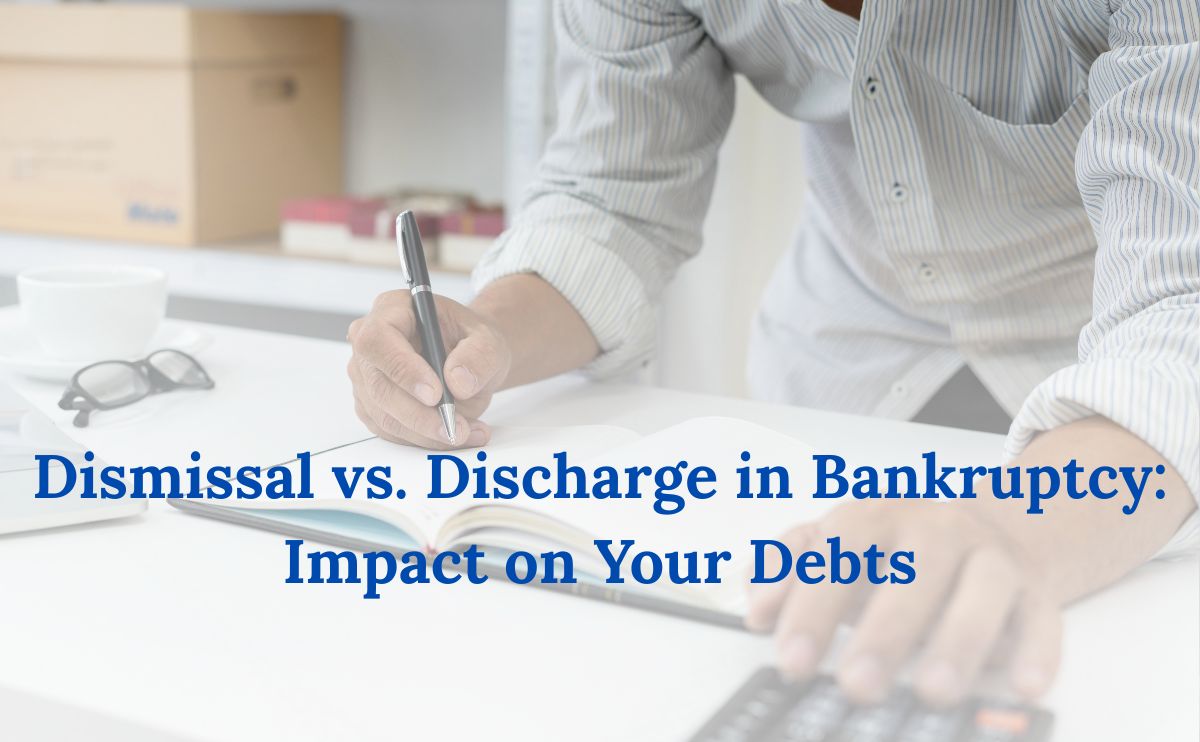Free Consultation
To discuss your financial situation and learn more about your debt relief options, give us a call at (520) 745-4429 or (480) 788-0098.
 Tucson(520) 745-4429
Tucson(520) 745-4429
 Mesa/Phoenix (480) 788-0098
Mesa/Phoenix (480) 788-0098

Money trouble can keep you up at night, and strange courtroom terms only add to the worry.
At Yusufov Law Firm PLLC, we help individuals and business owners in Mesa, Phoenix, and Tucson find a clear way out of financial stress. Today, we’re looking at two outcomes that decide whether your case wipes out debt or leaves you stuck with it.
The notes below are meant to inform, not act as legal advice, and every case demands a full review of the facts.
Before we dive deeper, let’s draw a bright line. A discharge is a court order that releases you from paying certain debts. A dismissal, in contrast, shuts the case without erasing anything you owe. Put plainly, discharge equals a fresh start, while dismissal means you still carry every balance and may even face mounting fees.
A discharge is the moment most filers wait for, because it ends the legal duty to pay listed debts. Creditors must stop calls, lawsuits, and garnishments tied to those balances.
Timing depends on the chapter you file under:
The court order can wipe out many unsecured debts, such as:
Some obligations survive, including:
Dismissal closes your case but leaves every debt intact. The automatic stay that once blocked collection vanishes, and creditors may restart calls, lawsuits, or garnishments the very same day.
Common triggers include:
Some cases end because the debtor asks the court to close the file. That request is rarely granted in Chapter 7 but is fairly common in Chapter 13. More often, dismissal is involuntary, after the court or trustee spots a problem.
Most cases are dismissed without prejudice, meaning you may refile as soon as the issue is fixed. Sometimes you may need to wait 180 days before refiling. A dismissal with prejudice usually adds a waiting period of at least 180 days, and may permanently prevent the debtor from discharging existing debt.
Let’s see how each outcome shapes life after bankruptcy.
Once the order is signed:
When a case is tossed out:
A discharged Chapter 7 shows on credit reports for ten years, and a discharged Chapter 13 shows for seven. A dismissed case typically does not appear independently; however, every delinquent account continues to report a negative history, resulting in no benefit to the credit profile.
| Factor | Discharge | Dismissal |
| Collector contact | Illegal on wiped-out debts | Permitted at once |
| Automatic stay | Replaced by a permanent ban on collections | Ends immediately |
| Credit score trend | Often rises within a year | Usually keeps falling |
| Refiling need | None, you’re done | Likely, if relief is still needed, and if allowed |
| Long-term debt load | Greatly reduced | Same or larger than before |
If your case was dismissed, the door is not necessarily closed forever, but you must follow fresh rules.
You may usually file again right away, provided you supply missing documents, pay fees, or correct other defects. Sometimes, you may need to wait 180 days before refiling.
Expect a waiting period of at least 180 days before attempting another case. The court may also permanently prevent the discharge of existing debt.
If a dismissal occurs within twelve months, the automatic stay in a new case will last only 30 days, unless you ask the judge for an extension. If two or more dismissals occur within twelve months, the automatic stay in a new case will not spring into effect at all unless you ask the judge for this protection.
Reaching the finish line takes planning and follow-through. Here are the steps that keep most cases on track.
Working with a bankruptcy lawyer boosts the odds of discharge. Attorneys know local procedures, catch paperwork errors early, and talk with trustees daily, which helps keep your case moving toward the best result.
Yusufov Law Firm PLLC fights for people and small businesses facing heavy debt in Mesa, Phoenix, and Tucson. If you’re weighing bankruptcy or need help after a dismissal, our team will review your circumstances and outline a path toward real relief. Call us at 520-745-4429 (Tucson) or 480-788-0098 (Phoenix/Mesa), or visit our contact page to set up a consultation. A short conversation can put you back in control of your finances.
To discuss your financial situation and learn more about your debt relief options, give us a call at (520) 745-4429 or (480) 788-0098.
© 2010-2026 Yusufov Law Firm PLLC. All Rights Reserved | Disclaimer | Sitemap |